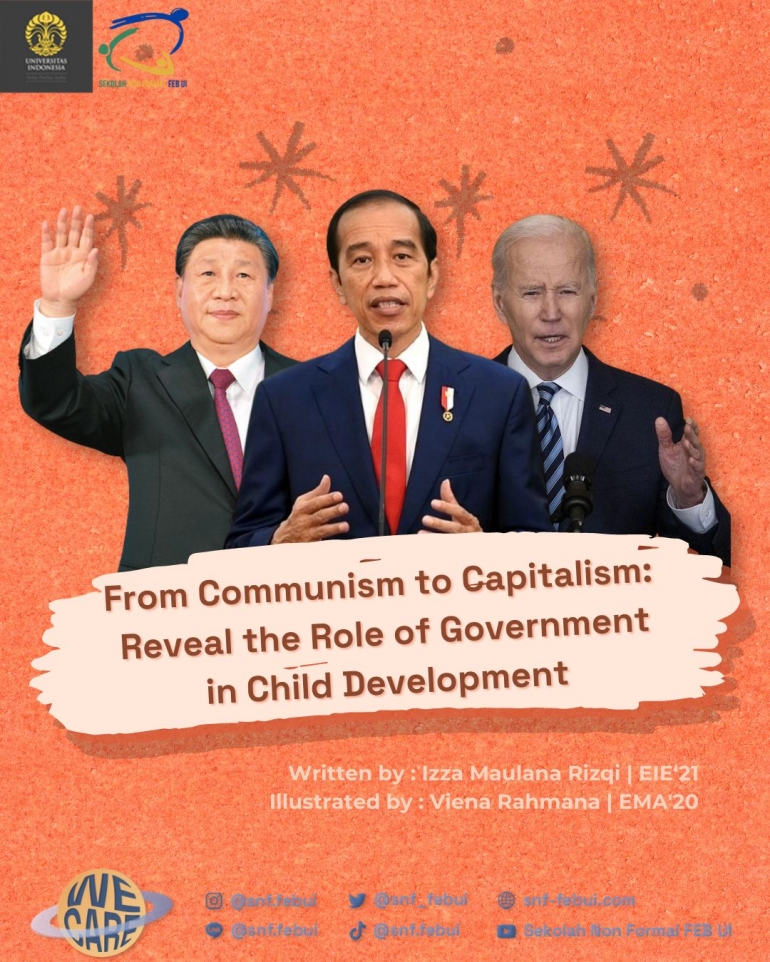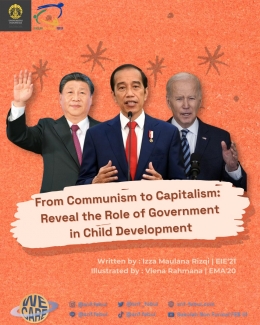Back then, the idea of marxism had become the dream of many youths in Eastern Europe, while the idea of "Liberte" sailed from Paris to New York. These two things create their own phenomenon, marxism sparked a revolt by the workers against the employers, whereas liberalism inspires resistance to tyranny by the youth. Besides that, in the middle of Indonesian archipelago, an idea was born from the thoughts of the ancestors, they call it "Pancasila". Just like what happens in other places, Pancasila has its own impact. Its existence inspires the Indonesians to move together for the sake of the nation in the midst of existing differences. Based on these facts, we can see that political ideology has a great influence on the state of society. Furthermore, in most countries, this political ideology is then developed into a system of government. With this development, namely as a system of government, the impact that spreads to the community is increasingly real and widespread. These impacts spread to various sectors, ranging from economic to social.
One of the sectors that cannot escape from the impact of the government system is children, especially child development. In this regard, questions arise, What is the role of government on children? What system of government is best for child development? What efforts should be made by the government to maximize child development?
Government and Children: How are the Two Connected?
When it comes to child development, the one party who is often considered the most influential is the parents. The statement is not wrong, but it is wiser to take into account other parties, one of which is the government. Whether we realize it or not, the government has a significant role in the development of children, starting from guaranteeing their legal rights, ensuring the welfare of children, to creating ideal conditions for child development.
Guaranteeing the legal rights of a child is one of the most important roles of government in child development. Meanwhile, this legal right refers to the United Nations Convention on the Rights of the Child which was adopted in 1989 and has been approved by 194 countries. This convention states that children are not objects owned by their parents.Instead, they are human beings with rights of their own. Therefore, they deserve to grow up with opportunities to learn, play and develop with dignity [1].
After years of being implemented by many countries in the world, this convention has proven to have quite a positive impact. First, after the adoption of this convention, it can be seen that there are developments in legal reform. Several countries have established specific rules regarding children's rights in their national constitutions. Furthermore, it is also stated that there is an increasing number of independent institutions related to human rights for children. Since the 90s, there have been at least 60 new institutions. This has a positive impact because the establishment of these institutions can better guarantee the implementation of children's rights. Finally, it was also reported that this convention encourages the emergence of special coordination mechanisms related to the implementation of children's rights in several countries. The impact tends to be positive since it can create a government that is committed to children [2].
The role of the government does not stop there, one role that is also important is ensuring the welfare of children. This welfare can be achieved through several ways, one of which is education. One sector that is allegedly significant in child development and closely related to the government is early childhood education. In short, early childhood education is an educational program that is oriented towards the development of children at a crucial stage in a person's life, namely the age of two to eight years [3]. Based on research conducted by the UK department of education, early childhood education has been shown to provide positive results on the cognitive and socio-emotional development of children [4]. The statement is proven in Australia after a series of investments in early childhood education by the Australian government since 2009, including the allocation of $61.1 million to support early childhood education and various policy changes such as setting quality standards for child care. At least, Australia has received three benefits from this investment, namely supporting the implementation of healthy child development, better transitioning of children into the formal education system, and creating equity of access to developmental opportunities during early childhood, which helps overcome disadvantage and its longer-term social consequences [5].
Lastly, an equally important role is creating ideal conditions for child development. Furthermore, these conditions can be in the form of political, social, or economic conditions of a country. The real example can be referred to the Great Recession that occurred in the United States from 2007 to 2009. At that time, the unemployment rate of parents increased, they struggled financially, resulting in a reduction in the quality of nutrition, care, and attention needed by children. As the impact, some children who have grown up during this period have experienced a great deal of instability in their lives. This lack of security and continuity can have deep and lasting impacts on children's development physically, emotionally, and cognitively [6].
Communism and Capitalism: Comparing Children at Opposite Poles
Based on the explanation in the previous section, it can be seen that the government does play a crucial role in the development of children. However, given the fact that not every country has the same system of government, questions such as "what is the impact of each system on children?" or "what system is best for child development?" become inevitable. Of course, all systems have their effects, but the comparison between two opposing systems, such as communism and capitalism, is interesting to discuss.







